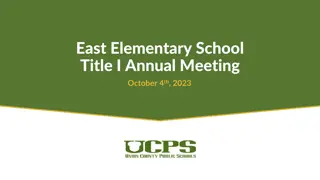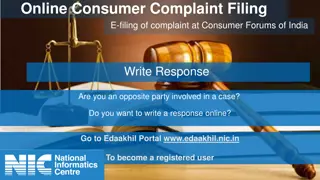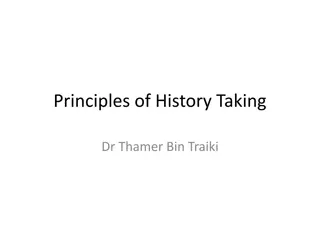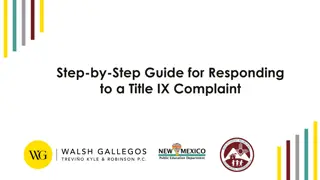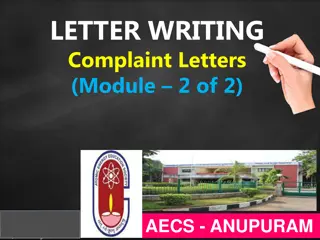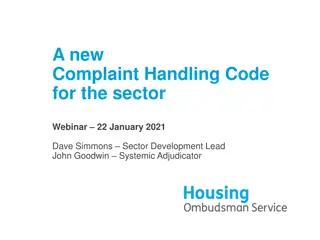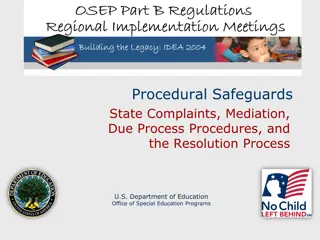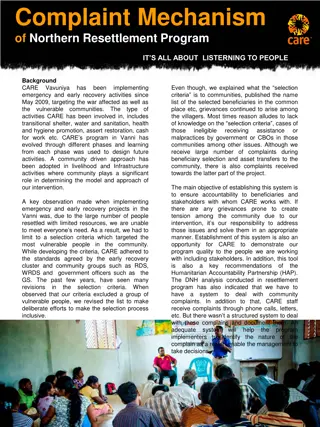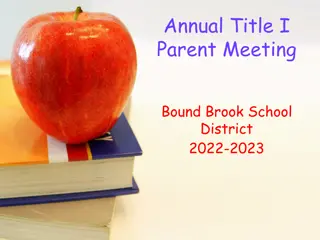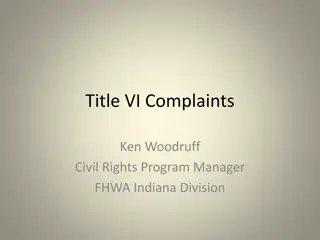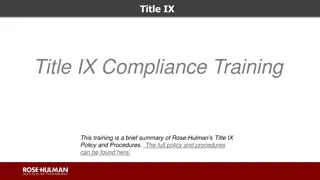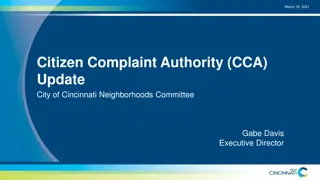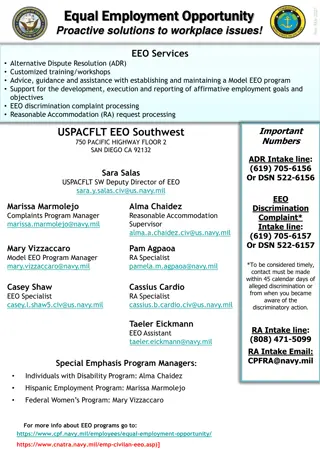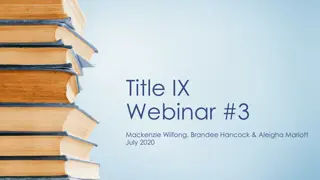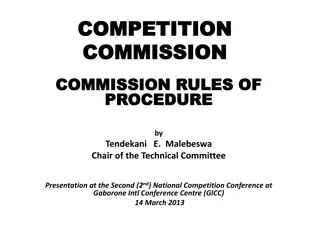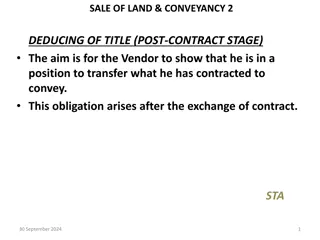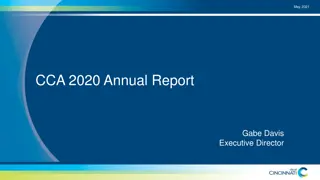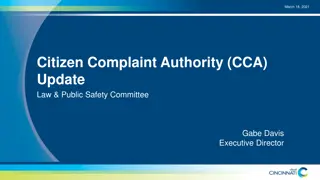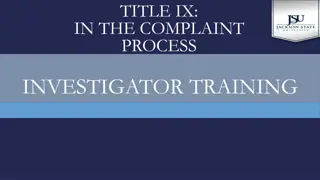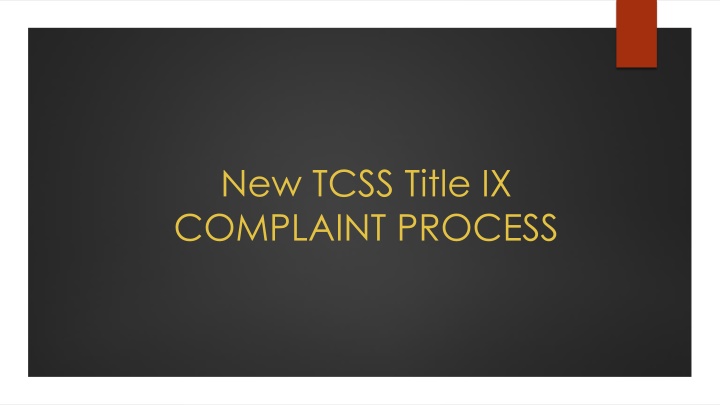
The Title IX Complaint Process: Regulations, Response, and Requirements
Explore the new regulations under Title IX regarding schools' response to sexual harassment allegations, the required actions, and what schools and districts must know. Learn about Quid Pro Quo harassment, actual knowledge criteria, and the definition of education programs or activities.
Download Presentation

Please find below an Image/Link to download the presentation.
The content on the website is provided AS IS for your information and personal use only. It may not be sold, licensed, or shared on other websites without obtaining consent from the author. If you encounter any issues during the download, it is possible that the publisher has removed the file from their server.
You are allowed to download the files provided on this website for personal or commercial use, subject to the condition that they are used lawfully. All files are the property of their respective owners.
The content on the website is provided AS IS for your information and personal use only. It may not be sold, licensed, or shared on other websites without obtaining consent from the author.
E N D
Presentation Transcript
New TCSS Title IX COMPLAINT PROCESS
What do the NEW regulations require? When should schools respond to sexual harassment allegations? How should schools respond to sexual harassment allegations? What else should schools and the district know?
What do the new regulations require? New regulations require a school or district to respond promptly and not in a deliberately indifferent manner when it has actual knowledge or sexual harassment in its education program or activity against a student in the United States.
Sexual Harassment under Title IX Quid Pro Quo harassment by a school employee to a student the employee conditions some type of aid, benefit, or service on the student s participation in unwelcome sexual conduct Unwelcome conduct determined by a reasonable person to be so severe, pervasive, and objectively offensive that it effectively denies a person equal access to the recipient s educational program or activity Other conduct defined by federal law Sexual assault Dating violence Domestic violence Stalking
Actual Knowledge Notice or allegations of sexual harassment are reported to ANY school employee OR any school employee personally observes such behavior Actual knowledge is met when any employee: Witnesses the conduct Hears about the conduct from the alleged victim or anyone else Receives a written report of the conduct from the alleged victim or anyone else
Education Program or Activity Includes locations, events, or circumstances over which a school or district exercised substantial control over the alleged perpetrator and the context in which the sexual harassment occurred Depending on the circumstances, may cover incidents that occur off school district property or online (e.g., field trip, school digital platform)
Basics If a school has actual knowledge of sexual harassment allegations, the school must respond promptly and not in a deliberately indifferent manner Supportive measures must be offered to the alleged victim (Complainant) These measures may not be punitive (no discipline unless the formal grievance process completed) A school may not continue with the grievance process in the absence of a formal complaint (but you still need to DO SOMETHING )
Basic Steps School or district has actual knowledge of conduct that may constitute sexual harassment Title IX Coordinator meets with alleged victim to discuss supportive measures and the process for filing a formal complaint The Investigator leads the investigation of the complaint and written notice is given to the parties and their parents/guardians The Investigator gathers and reviews evidence and prepares a draft of the investigative report The parties and their parents/guardians review and respond to the draft of the investigative report The investigative report is submitted to the Decision-maker The Decision-maker reviews all materials and makes a written determination of responsibility
Roles Title IX Coodinator Coordinates compliance efforts and acts as record-keeper Meets with alleged victim and his/her parents/guardians once made aware of alleged sexual harassment Coordinates implementation of supportive measures at the local school level Signs a formal complaint to initiate grievance process If there is no formal complaint, this process stops Once a formal complaint is filed, written notice must be provided to all parties and parents/guardians and include a copy of grievance procedures
Roles Investigator Administrator or certified personnel as appropriate (e.g., assistant principal, counselor, Sr. Director of HR) Conducts interviews of the involved individuals and witnesses Collects evidence Provides equal opportunity for parties to present witnesses and other inculpatory and exculpatory evidence and cannot restrict the parties from discussing the allegations Drafts investigative report No conflict of interest or bias Parties and their parents and guardians provided opportunity to review evidence and respond to report before investigative report is finalized The district has the burden of proof and burden of gathering evidence to make a responsibility determination
Roles Decision-maker Cannot be the Investigator, but Investigator can make recommendations Administrator or certified personnel as appropriate (e.g., principal, Central Office Director, Deputy Superintendent) Allows the involved parties to submit written, relevant questions to ask to the other party or other witnesses and provides each side answers to these questions Makes a determination of responsibility based upon the preponderance of the evidence standard (more likely than not) Issues written determination that: identifies the allegations in the formal complaint describes all procedural steps taken includes findings of fact and conclusions states the decision reached on each allegation and the rationale for that decision and explains the procedures and permissibile bases for appeals.
Appeal Appeal of the determination of responsibility or dismissal of a formal complaint must be offered if a party or parent/guardian asserts that: A procedural irregularity affected the outcome New evidence may affect the outcome and was not previously reasonably available The Title IX Coordinator, Investigator, or Decision-maker had a conflict of interest of bias that affected the outcome The Decision-maker on appeal must be someone new to the process The Decision-maker on appeal must be trained
How is Discipline Handled? Under the regulations, the entire Title IX process must be complete before any discipline can be administered (but can offer supportive measures) Emergency removal of a student is a very high bar (but an employee may be placed on paid administrative leave) Rely on legal counsel to document choices Difficult issue under the new regulations
When must or may a formal complaint be dismissed? At any time during the grievance process, TCSS is required to dismiss a complaint if the conduct alleged in the formal complaint: Would not constitute sexual harassment as defined by Title IX even if proven; Did not occur in the school system s education programs or activities; or Did not occur against a person in the United States Additionally, TCSS may dismiss a complaint where: The Complainant notifies the Title IX Coordinator in writing that the complainant wishes to withdraw the formal complaint or allegations; The Respondent is no longer enrolled in or employed by the school system; or Specific circumstances prevent the school system from gathering evidence sufficient to reach a determination regarding responsibility. TCSS will provide the parties with written notice of a dismissal, whether mandatory or discretionary, and the reason for the dismissal. Dismissal of the formal complaint under Title IX does not preclude action under another policy or the Code of Conduct.
Professional Development and Recordkeeping (7 years) All employees who are part of the Title IX grievance process must be trained and records of this professional development training must be maintained A copy of the materials used for professional development must be provided on our TCSS website Records of all investigations, appeal, and informal resolution records must be retained Records of any actions, including supportive measures, taken in response to a report of sexual harassment (whether or not a formal complaint is filed)

